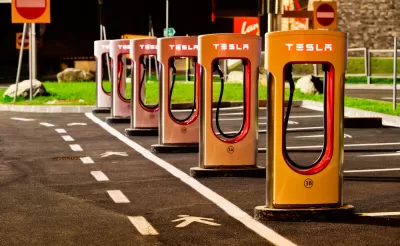When Elon Musk talks, lots of people listen. Some also respond.

In case you missed it, Elon Musk last week announced a new "Master Plan," this one subtitled "Part Deux," in an apparent nod to a 1993 comedy film starring Charlie Sheen.
The master plan, like the movie, is a sequel. Musk's first master plan was released ten years ago, describing a plan to create Tesla's line of electric vehicles. The new master plan picks up where the original left off, setting the following agenda:
Create stunning solar roofs with seamlessly integrated battery storage
Expand the electric vehicle product line to address all major segments
Develop a self-driving capability that is 10X safer than manual via massive fleet learning
Enable your car to make money for you when you aren't using it
Following that proclamation, a debate has emerged. On one side, those who believe Musk has failed to grasp crucial concepts about how transportation works. On the other side, those who eagerly anticipate the future described by the new master plan.
The former is argued by Jarrett Walker on his Human Transit blog. "Musk assumes that transit is an engineering problem, about vehicle design and technology," according to Walker. "In fact, providing cost-effective and liberating transportation in cities requires solving a geometry problem, and he’s not even seeing it."
On the other side, Alissa Walker writing for Curbed: "Tesla is actually shifting from an electric car company to a sustainable transportation company. And this could mean something revolutionary for our cities."
FULL STORY: Master Plan, Part Deux

Maui's Vacation Rental Debate Turns Ugly
Verbal attacks, misinformation campaigns and fistfights plague a high-stakes debate to convert thousands of vacation rentals into long-term housing.

Planetizen Federal Action Tracker
A weekly monitor of how Trump’s orders and actions are impacting planners and planning in America.

In Urban Planning, AI Prompting Could be the New Design Thinking
Creativity has long been key to great urban design. What if we see AI as our new creative partner?

King County Supportive Housing Program Offers Hope for Unhoused Residents
The county is taking a ‘Housing First’ approach that prioritizes getting people into housing, then offering wraparound supportive services.

Researchers Use AI to Get Clearer Picture of US Housing
Analysts are using artificial intelligence to supercharge their research by allowing them to comb through data faster. Though these AI tools can be error prone, they save time and housing researchers are optimistic about the future.

Making Shared Micromobility More Inclusive
Cities and shared mobility system operators can do more to include people with disabilities in planning and operations, per a new report.
Urban Design for Planners 1: Software Tools
This six-course series explores essential urban design concepts using open source software and equips planners with the tools they need to participate fully in the urban design process.
Planning for Universal Design
Learn the tools for implementing Universal Design in planning regulations.
planning NEXT
Appalachian Highlands Housing Partners
Mpact (founded as Rail~Volution)
City of Camden Redevelopment Agency
City of Astoria
City of Portland
City of Laramie





























